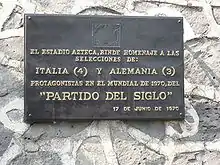Italy v West Germany (1970 FIFA World Cup)
The semi-final of the 1970 FIFA World Cup between Italy and West Germany has been called the "Game of the Century"[2] (Spanish: Partido del Siglo; Italian: Partita del secolo; German: Jahrhundertspiel). It was played on 17 June 1970 at the Estadio Azteca in Mexico City. Italy won 4–3 after five of the seven goals were scored in extra time, the record for most goals scored during extra time in a FIFA World Cup game. (Four goals were scored in extra time in the 1982 semifinal between West Germany and France.) The result eliminated West Germany from the tournament while Italy would go on to lose to Brazil in the final.
 The plaque commemorating the match at the Estadio Azteca in Mexico City | |||||||
| Event | 1970 FIFA World Cup | ||||||
|---|---|---|---|---|---|---|---|
| |||||||
| After extra time | |||||||
| Date | 17 June 1970 | ||||||
| Venue | Estadio Azteca, Mexico City | ||||||
| Referee | Arturo Yamasaki Maldonado (Mexico)[1] | ||||||
| Attendance | 102,444 | ||||||
The match
Italy led 1–0 for the majority of the match, after Roberto Boninsegna scored in the 8th minute. West German defender Franz Beckenbauer dislocated his shoulder after being fouled, but stayed on the field carrying his dislocated arm in a sling, as his side had already used their two permitted substitutions.[3]
Defender Karl-Heinz Schnellinger equalised for West Germany in the second minute of injury time. German television commentator Ernst Huberty famously exclaimed "Schnellinger, of all people!" (in German: "Schnellinger! Ausgerechnet Schnellinger!"), since Schnellinger played in Italy's professional football league, Serie A, at A.C. Milan (for whom he had never scored). It was also his first and only goal in a career total of 47 matches for the West German national team. At the end of regulation time, the score was level at 1–1, forcing the match into extra time.
Gerd Müller put West Germany ahead in the 94th minute following a defensive error by Fabrizio Poletti who had just come into the game as a substitute, but Tarcisio Burgnich tied it back up only four minutes later, and then striker Luigi Riva put the Italians in front again with a superb goal. Müller scored yet again, this time with a header, for West Germany to tie the score at 3–3. Yet, as the live television coverage was still replaying Müller's goal, Italian midfielder Gianni Rivera scored what proved to be the game-winning goal in the 111th minute. Being left unmarked near the penalty area, Rivera had connected perfectly with a fine cross made by Boninsegna, clinching the victory for Italy at 4–3.[4]
Match overview
| Italy | 4–3 (a.e.t.) | |
|---|---|---|
| Boninsegna Burgnich Riva Rivera |
Report | Schnellinger Müller |
Italy
|
West Germany
|
|
| |||||||||||||||||||||||||||||||||||||||||||||||||||||||||||||||||||||||||||||||||||||||||||||||||||||||||||||||||||||||||||||
See also
References
- Arturo Yamasaki was born in Peru, where he begun his career as referee. He moved from Peru to officiate matches in Mexico in 1968, and hence he attended this World Cup as a representative of the Mexican football federation.
- Matt Wagg (28 June 2012). "Euro 2012: five classic tournament matches between Germany and Italy including the 'Game of the Century'". telegraph.co.uk. Retrieved 27 April 2016.
- "Der Kaiser, the brains behind Germany". FIFA. Retrieved 24 July 2009.
- 1970 FIFA World Cup Mexico. Match report. Italy - Germany FR FIFA.com
External links
Motson, John (2006) Motson's World Cup Extravaganza GREAT GAMES: ITALY 4-3 WEST GERMANY, 1970